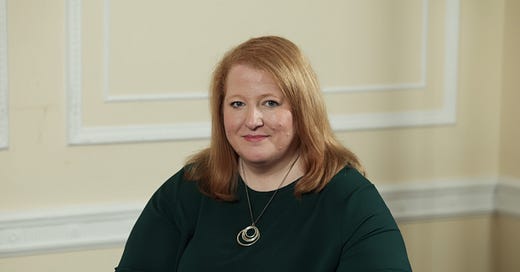After a month of anticipation, I left my meeting with Northern Ireland’s Justice Minister Naomi Long feeling deeply frustrated and ultimately deflated. The conversation laid bare the reality that even well-intentioned allies can make catastrophic mistakes, and, worse, fail to recognise them when confronted with the harm they have caused.
There was no vote in the Northern Ireland Executive to ban puberty blockers. The ban was passed by consensus. Long’s opposition wouldn’t have changed the outcome, but it would have sent a message that trans people and their allies had someone in power who saw them. She didn’t, and the silence was deafening.
Long was clear from the outset - her party’s decision to support the Northern Ireland puberty blocker ban had nothing to do with the Cass Review. In fact, she was more critical of Cass than I had expected, acknowledging some of the political motivations behind it. She said Alliance backed the ban because of the Medicines and Healthcare products Regulatory Agency (MHRA), which claimed the “prescribing environment” for puberty blockers was unsafe. That claim, Long said, she took at face value.
In the thread that led to the meeting being arranged, Long had said, “We were faced with medical evidence that puberty blockers may not be safe for teens: we couldn't ignore that,” but in the meeting she acknowledged they had been used safely for decades and that was not her primary concern. That was the prescribing environment.
When pressed on why an entire class of people had to suffer because of the alleged failings of one provider, there was no real answer. Instead, Long pointed to broader issues in online prescribing; weight-loss drugs and other medications being sold without oversight. It was a deflection, not an explanation.
She admitted she wasn’t a medical expert but an engineer by education. That shouldn’t be seen as a failing. Politicians regularly rely on experts and should feel able to do so. The problem is that gender-critical ideologues have been systematically embedded into the very institutions providing that advice. My seven-page document laid this out in excruciating detail: Kemi Badenoch’s open admission that she had ensured “gender-critical men and women in the UK government, holding the positions that mattered most in Equalities and Health,” the direct links between Christian Concern, the LGB Alliance, Tufton Street, the Heritage Foundation, and the trans-hostile policies now sweeping the UK. Long had read Cass, but how deeply had she considered the machinery behind it?
To her credit, she was across more detail than I expected. She was no fan of Badenoch, but she wasn’t impressed with Wes Streeting either. She acknowledged his Christian Concern connections, his ties to organisations behind Trump’s anti-trans war. She was aware of how right-wing networks in the US were influencing policy in the UK. And yet, despite that, she still trusted the MHRA’s assessment without question.
Throughout the meeting, I kept wondering if Long had forgotten, or simply didn’t care, that I am trans. My concerns were either brushed past or redirected, and I found myself being talked over, again and again. I had spent weeks preparing, determined not to sound like a conspiracy theorist while laying out the grim reality of the coordinated assault on trans rights. It didn’t matter.
I hadn’t gone into this meeting to argue about what Cass got wrong - I wanted to demonstrate why Cass was wrong. That Cass was handpicked by a government intent on producing an anti-trans report, that trans voices were excluded while anti-trans groups were given seats at the table, that one of those groups has been classified as a hate group in Ireland. None of that changed anything.
Long had questions of her own she said, and pushed back on some points at Executive level. But at the end of the day, she agreed to the ban. There is no escaping that fact. Whatever private frustrations she may have had, she chose not to stand against it. That was a failure that is hard to forgive.
She is not a transphobe. She has been one of the most vocal defenders of trans prisoners, something that falls under her remit as Justice Minister, not Health. If there is another Executive party leader fighting for trans people in any way, I’ve yet to see it. But being “not transphobic” is not the same as being pro-trans. And when it mattered most, Long sided with cis power over trans survival.
She tried to avoid being seen as following the UK government’s lead, but she ended up doing exactly that. The decision to accept the MHRA’s advice uncritically while acknowledging the political nature of Cass exposes a glaring contradiction in her reasoning. One that she either doesn’t recognise or doesn’t want to admit.
As the meeting wrapped up, Long was asked, knowing everything she now knows, would she make the same decision to back the ban?
"I don’t know."
That answer, more than anything else, says it all.



